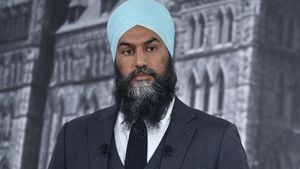French President Emmanuel Macron and US President Donald Trump met on February 24, 2025, to discuss pressing geopolitical concerns surrounding Ukraine, setting up what could be regarded as a significant dialogue amid shifting international relations. Macron characterized the meeting as pivotal, envisioning it as "a turning point" and perceiving it as a moment to forge common ground.
At the White House, Macron underscored the importance of ensuring security guarantees for Ukraine, stating emphatically, "This peace cannot mean the surrender of Ukraine." The French leader conveyed the urgency of the situation, acknowledging Ukraine's struggles as not only local but part of broader collective security for Europe.
Trump, whose approach to foreign policy has often been characterized as unilateral and transactional, seemed committed to his fast-paced, big-decision approach. He suggested optimism about resolving the conflict: "I think we could end it within weeks – if we're smart. If we're not smart, it will keep going." Such statements have added confusion and concern among European allies who fear any reduction of American support for Kyiv.
Macron's visit was not merely ceremonial; it served as the opening act to broader discussions involving European leaders. European Council President António Costa swiftly arranged for a videoconference among EU leaders to discuss Macron's insights from Washington. Costa reported, "To prepare for the Special European Council on 6 March, I am organizing a videoconference of the members of the EU Council, to hear from President Macron about his recent visit to Washington D.C."
The backdrop for this newfound dialogue stems from Trump's earlier comments questioning the U.S.'s involvement in the conflict, where he labeled Ukrainian President Volodymyr Zelenskyy as "a dictator without elections." These words raised eyebrows across Europe, prompting fears over the broader commitment of the U.S. to its traditional role as a security guarantor.
During the joint press conference, Macron highlighted the historical nature of past negotiations with Russia, mentioning the lack of security guarantees as something to avoid repeating. He stated, "I think no one wants to live in a world where international borders can be violated from one day to the next," reinforcing the idea of the necessity for strong, credible deterrence against Russia.
Macron also indicated Europe's readiness to amplify defense commitments for Ukraine, saying, "A lot of my European colleagues are ready to be engaged, but we do need this American backup." This shared sentiment emphasized the delicate balance Europe must maintain as it navigates relationships with both Russia and the United States.
The contrasting approaches of Macron and Trump during their interactions illustrated the difficulties of negotiating under the current U.S. administration. While Macron sought to present unity and collaboration, Trump appeared more preoccupied with the transactional aspects of international relations.
After the meeting, Macron returned to Paris with both optimism and considerable caution. Although he was seen as rekindling relations, reports suggested he left with little more than platitudes for discussion and no concrete commitment from Trump, reminiscent of the more fruitful talks during the Biden presidency.
With tensions rising and imminent discussions on European unity approaching, Macron's visit remains especially noteworthy. The ramifications of the meeting could have lasting impacts on not just Ukraine, but the transatlantic partnership as a whole. The importance of securing reliable peace negotiations can not be overstated—Kratos knows well the stakes involved amid these international dialogues.
Macron's visible efforts to gain U.S. support for European-led peacekeeping measures, should they come to fruition, will likely set the tone for the upcoming summit of European leaders. Macron is preparing to work closely with British Prime Minister Keir Starmer, who is also slated for consultations with the U.S. on European defense strategies.
Trump's rhetoric continues to shape the international discourse, where it intertwines with the realities facing Europe today. His willingness to engage with Russia contrasts sharply with the more cautious perspectives of European leaders who are attempting to forge unity and shared strategy heading forward. The intersection of these narratives remains contentious—a clash between speed and diplomacy.
With looming discussions on Ukraine's future and the long-term security of Europe, it remains evident how dynamic and precarious these international relations are. Macron and Trump stand at the forefront of these tensions, both holding visions of the future but often approaching it through distinctly different lenses. Whether this meeting ushers in genuine progress or simply recycles familiar platitudes is yet to be seen, but both leaders acknowledge the stakes involved.



